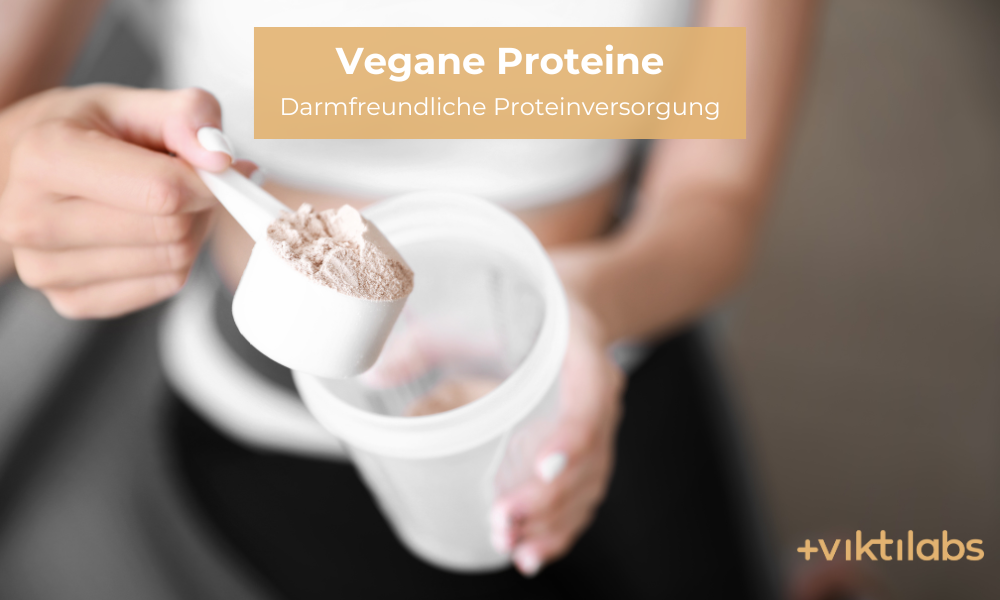A good protein supply is of great importance for health.
Protein, also called protein, is not only important for building and maintaining muscle. All tissues and organs depend on protein. The antibodies of the immune system and many hormones are also made of protein. Protein is also involved in all biochemical functions in the body. Enzymes are made of protein.
So without protein nothing works.
When we think of protein, we often think of meat, eggs and dairy products. But there are also very valuable plant-based sources of protein.
Here you will learn how you can ensure your protein supply with plant-based protein and how the intestinal flora can improve protein utilization.
combination of rice and pea protein
Pea and rice protein are often combined in protein powders. For good reason.
Plant-based protein sources lack certain essential amino acids. However, a good supply of essential amino acids is very important. Because, as the name suggests, they are essential. This means that we need to consume these amino acids in sufficient quantities every day.
This problem can be avoided by cleverly combining different protein sources. Pea and rice protein are the ideal duo in this respect.
Pea protein is rich in the amino acids lysine and leucine, which are not sufficiently present in rice protein. Rice protein, on the other hand, contains a lot of methionine, which is only present in small amounts in pea protein.
If you combine the two, you achieve a high biological value. This means that the proportions of the individual amino acids correspond to the body's needs. This means that the body can utilize this protein combination very well.
Particularly useful amino acids
Rice and pea protein provide you with a good supply of the most important amino acids. But there are a few particularly useful amino acids that you can eat a little more of.
Leucin
Leucine is the limiting factor in muscle building: the more leucine there is, the easier it is to produce muscle protein. A good supply of leucine is therefore of central importance for muscle building. 1
glutamine
Glutamine promotes muscle building indirectly by reducing muscle breakdown and promoting muscle regeneration.
This amino acid is also very important for the intestines. It promotes the development and repair of the intestinal mucosa. Glutamine can therefore strengthen the integrity of the intestinal barrier and counteract leaky gut.
In addition, glutamine can reduce chronic inflammatory processes in the intestine, which is particularly important in chronic inflammatory bowel diseases such as Crohn's disease or ulcerative colitis.
Glycine
Glycine is important for connective tissue because it is needed for collagen and elastin synthesis. 2 It can therefore also indirectly strengthen the intestinal barrier.
In addition, it is an important building block for glutathione synthesis alongside glutamine and cysteine. 3 Glutathione is the body's central detoxification molecule.
lysine
Lysine is also important for collagen and elastin synthesis. 4 It can also strengthen the intestinal barrier and support the body's own protein synthesis.
Better protein utilization through probiotics and prebiotics
The intestinal flora plays an important role in protein utilization. Probiotics and prebiotics are needed for a healthy intestinal flora. Probiotics are useful bacteria that can settle in the intestine. Prebiotics, on the other hand, serve as food for these bacteria.
Bacillus Coagulans promotes protein digestion
Bacillus coagulans is a particularly interesting bacterium. It can improve protein absorption and utilization by aiding the digestion of proteins in the small intestine. This leads to better absorption of amino acids. 5
This strain of bacteria can also improve recovery after intense exercise and reduce inflammation. This promotes muscle recovery after exercise. 6
Other probiotic bacteria can promote muscle growth in a similar way. 7
Prebiotics for maintaining a healthy intestinal flora
Taking probiotics is one thing. Keeping these beneficial bacteria alive and promoting their growth is another. This is where fiber comes into play. Fiber is a prebiotic: it serves as food for the beneficial intestinal bacteria.
For example, psyllium husks can promote the growth of bifidobacteria and lactobacilli. 8 Acacia fibers, on the other hand, promote the proliferation of Akkermansia muciniphila and Faecalibacterium prausnitzii. 9
PurePlant Protein Pro: Synergy of probiotics, prebiotics and protein
Viktilabs has developed a protein complex that combines all of the above-mentioned substances: rice and pea protein as well as leucine, lysine, glutamine and glycine for an optimal protein supply.
Bacillus coagulans for better protein utilization, as well as acacia fiber and psyllium husks as valuable sources of fiber.
The PurePlant Protein Pro naturally has the usual Viktilabs quality: The product is free from unnecessary additives such as colorants, sweeteners, binding agents and separating agents. Ongoing quality controls and extensive pollutant analyses guarantee the highest purity.
















